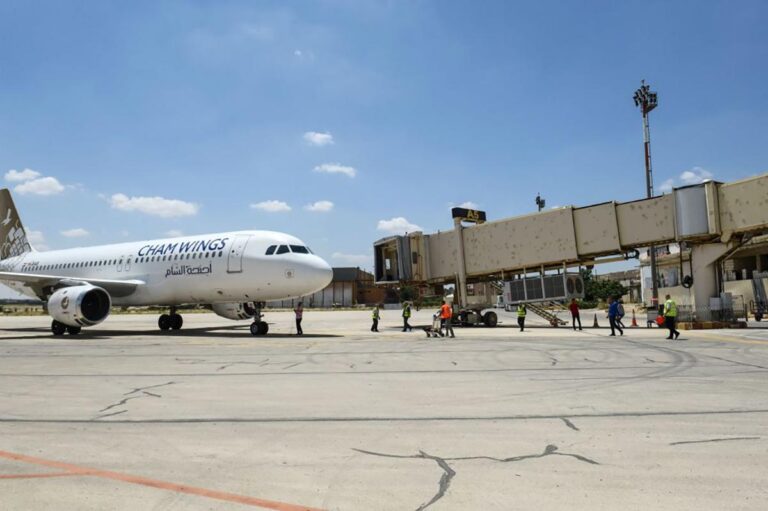
The Syrian government claimed that Israel struck Aleppo International Airport on Sunday, following similar strikes on the country’s airports in Aleppo and Damascus on Thursday.
The latest strike hit the runway of Aleppo airport, putting it out of service just hours after it was fixed following the previous strike, according to Syrian media.
The strikes came after rockets were fired from Syria into the Golan Heights, and as fighting escalates on Israel’s northern border. It comes about a week after Hamas launched an unprecedented attack on Israel on October 7, which has killed over 1,300 Israelis and injured thousands.
Aleppo Airport has been attacked for the second time in 48 hours by the Zionist entity. It was due to reopen tomorrow at 8am and is now out of operation again. Waiting for official statement regarding casualties and damage pic.twitter.com/OtFQgwA5wB
— vanessa beeley (@VanessaBeeley) October 14, 2023
Did Israel really bomb the airports?
The Israeli government did not comment on the claims (as a rule, Israel does not comment on specific strikes in Syria).
However, “a senior Israeli Foreign Ministry official accused Iran of trying to deploy arms in Syria to attack Israel and said Jerusalem was taking action to foil that effort,” the Times of Israel reported.
Joel Rayburn, director of the American Center for Levant Studies, wrote on X that the repeated Israeli strikes to disable the Syrian airports are “a strong indication that 1) the Iranian regime is trying to move strategic weapons to or via Syria to open a northern front and 2) the Israelis are determined to preempt that.”
Joshua Zarka, head of strategic affairs at the Foreign Ministry, responded to Rayburn: “1. They are. 2. We are.”
1. They are
— Joshua L. Zarka (@yzarka) October 15, 2023
2. We are https://t.co/YAHfRkvxA9
Why would Israel have bombed the airports?
Syria’s international airports were put out of service by airstrikes that damaged their runways, causing all flights to be diverted to Latakia. If Israel did in fact launch the airstrikes, it would mark their first attack on Syria since Hamas’ assault.
Notably, these two airports function both as civilian terminals and military bases. They have repeatedly acted as transit hubs for Iranian weapons designated for Hezbollah.
The timing of the strikes is also noteworthy, coming one day before the scheduled visit of Iranian Foreign Minister Hossein Amir-Abdollahian.
The minister’s tour of various Middle Eastern countries reportedly aims to garner more support for Hamas from Israel’s neighbors. As part of this tour, the Iranian foreign minister also met with the leader of Hamas on Sunday, fueling speculations of a potentially widening conflict.
Historically, Iran has been a steadfast supporter of Hamas, contributing funds, weapons, and training. Iran currently provides $100 million annually to Hamas, most of which goes towards buying weapons and digging tunnels to attack Israel.
Iran celebrated Hamas’ attack on Israel and fiercely condemned Israel’s counteroffensive in Gaza. In addition, Iran has been a key ally of Syrian President Bashar al-Assad, supporting his regime against opposition groups and ISIS.
These are not the first attacks on Syria’s airports attributed to Israel this year. The IDF has said it targets weapons shipments believed to be intended for Iran-backed groups, particularly the Hezbollah terror group from Lebanon. Additionally, the airstrikes attributed to Israel have consistently struck Syrian air defense systems.
Israel’s attack on Syria’s nuclear reactor in 2007
In 2007, Israel took decisive action against Syria’s nuclear program, demonstrating the Jewish state’s commitment to neutralizing perceived threats.
While Israel traditionally adheres to a strategy of ambiguity regarding its military operations, the 2007 attack offered a clear insight into the lengths the country will go to to ensure its security. These proactive measures echo Israel’s present stance toward perceived threats, as seen in its alleged strikes on Syrian airports.
Overall, the history between Israel and Syria has been marked by tension, hostility, and multiple wars since the establishment of the State of Israel.
The two countries clashed in major conflicts including Israel’s 1948 War for Independence, the 1967 Six-Day War, and the 1973 Yom Kippur War. Syria’s strategic Golan Heights, captured by Israel in 1967, remains a significant point of contention between the two countries.
The post-2000 era saw some attempts at backchannel peace talks, though none led to significant breakthroughs. However, the situation escalated again in 2007 when Israel became concerned about Syria’s nuclear ambitions.
The Mossad’s surveillance on high-ranking Syrian officials led them to an alarming discovery in 2007. The laptop of the director of Syria’s Atomic Energy Commission contained detailed photos of a suspicious nuclear reactor, similar to a North Korean design. Given North Korea’s recent pledge to shut down a similar reactor, Israel was highly alarmed.
The Israeli government took matters into its own hands to remove the threat of the nuclear reactor.
This decision reflected the “Begin Doctrine,” named after former Israeli Prime Minister Menachem Begin. The policy says that Israel will not allow any country or regime that calls for its destruction to develop the weapons to achieve that goal.
Acting on this policy, Israeli jets clandestinely entered Syrian airspace, flying low to avoid detection. The jets dropped more than 20 tons of explosives on the nuclear reactor facility in less than two minutes, destroying it.
Syrian President Bashar al-Assad’s alliance with Hezbollah has been a consistent concern for Israel. The Hezbollah terror group is a staunch supporter of Assad’s reign. Over the decades, it has carried out devastating attacks against Israelis and Jews, including during Hamas’ current assault on Israel.
Originally Published Oct 15, 2023 04:27PM EDT
